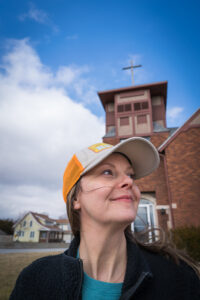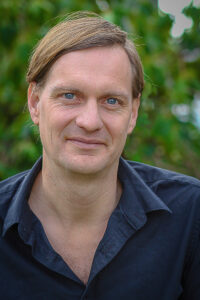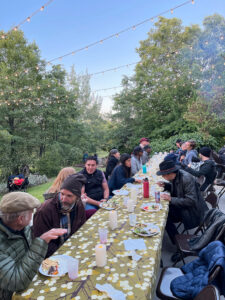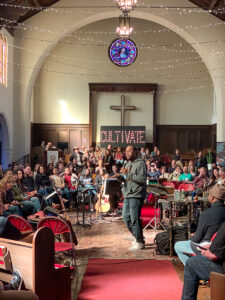2022 Annual Report:
St. Mark’s United Methodist Church in Goshen, Ind., is thriving.
Nearly a century old, St. Mark’s hulking brick building is located on a busy street in Goshen, a northern Indiana town with an ethnically diverse population of approximately 32,000 people. The church anchors Chamberlain, a neighborhood with an equally aged school, modest homes, a family-owned Mexican restaurant and a small park shaded by mature trees.
 Just around the corner is the Elkhart County Work Release Center. Shannan Martin (right), who lives down the street, points to its presence as the unlikely source of revival at St. Mark’s. Ten years ago, she and her family moved to the neighborhood and joined the church. They wanted to live more intentionally as neighbors in what she describes as “an overlooked” pocket of Goshen.
Just around the corner is the Elkhart County Work Release Center. Shannan Martin (right), who lives down the street, points to its presence as the unlikely source of revival at St. Mark’s. Ten years ago, she and her family moved to the neighborhood and joined the church. They wanted to live more intentionally as neighbors in what she describes as “an overlooked” pocket of Goshen.
St. Mark’s developed a partnership with the work release program, which has blessed the congregation, according to Martin. She tells the story of a longtime parishioner, a woman in her 90s, and a younger woman in the county work-release program. On Sundays, they worship from the same pew and sometimes share a hymnal. When the older woman learned that her friend was about to move to a new apartment, she wanted to buy a few household items to support the young woman as she seeks a fresh start. It’s one example of the congregation’s neighborhood focus and its emphasis on human relationships.
“St. Mark’s is a vibrant and honest presence, a place of hope and harbor for my family and our community,” she says. “I believe this is what the future of the healthy church looks like.”
Two thousand miles away in the San Diego neighborhood of Golden Hill, Christiana Rice feels a similar movement stirring. She and her family are part of a non-denominational home church network.
Rice strives to live the Christian faith in daily life and on her street—a place where the wealthy and the poor live together amid skyrocketing home prices and homelessness. That means sharing meals and scripture study with people who live close to her house and offering a listening ear to neighbors and others.
A few years ago, Rice reached out by email to her neighborhood faith community during a moment of intense personal grief. She was soon surrounded by neighbors who walked to her home willing to grieve with her. Rice believes such moments are the expression of a community centered on the love of God.
“Our communal call is to discover the sacred in our ordinary lives,” she says.
Martin and Rice live far from one another, but their congregations are connected through the Parish Collective. It is an ecumenical network of more than 1,000 congregations across the country that are discerning a call to mission in their communities. With support through Lilly Endowment’s Thriving Congregations Initiative, Parish Collective is expanding its national network to provide resources and support to congregations as they seek to strengthen ministries that foster relationships and service in their neighborhoods. It does this by connecting congregations through regional learning communities and national conferences and by providing individualized coaching to pastors and lay leaders.
Engaging in local place-based ministry
 “Our definition is that church plus neighborhood equals parish,” says Tim Soerens (left), Parish Collective’s co-founder and executive director. “Parish Collective invites people to understand the importance of parish, that the church is meant to embody the gospel of the kingdom of God in Christ through practice and presence in a particular place, so that the people in that place know that God is concerned about their specific needs, gifts, concerns and well-being.”
“Our definition is that church plus neighborhood equals parish,” says Tim Soerens (left), Parish Collective’s co-founder and executive director. “Parish Collective invites people to understand the importance of parish, that the church is meant to embody the gospel of the kingdom of God in Christ through practice and presence in a particular place, so that the people in that place know that God is concerned about their specific needs, gifts, concerns and well-being.”
The word “parish” has deep roots in Roman Catholic and Anglican traditions. Historically, those Christian communities have defined parishes as places that have social and theological connections within a specific geographic area, such as a neighborhood. It’s a concept that inspires Parish Collective’s vision.
Soerens lives parish life in the diverse, urban South Park neighborhood of Seattle, where he is co-founder of Resistencia Coffee, a neighborhood coffee shop, as well as the South Park Idea Lab. He is author of Everywhere You Look: Discovering the Church, Right Where You Are (2020).
Balcony time
In 2019, Parish Collective had been helping congregations understand and integrate the parish model into their missions for almost a decade when it received a $48,855 planning grant through Thriving Congregations.
Launched in 2019, Thriving Congregations seeks to encourage congregations to strengthen ministries that help people deepen their relationship with God, enhance their connections with each other and contribute to the flourishing of their communities.
At that time, Parish Collective was facing a pressing challenge of rapid growth. The increasing number of congregations seeking out the Seattle-based organization to help them reimagine and strengthen their neighborhood-based ministries was outstripping its capacity to respond. The requests also caused Parish Collective to wonder whether its mission and its strategies for working with congregations should be evaluated.
According to Soerens, the planning grant helped the organization clarify its mission and gain a new perspective on how to engage congregations as they explored how God may be at work in their neighborhoods.
Parish Collective used planning funds to conduct an extensive campaign to listen to ordained and lay leaders across three diverse geographic areas–Pacific Northwest (Portland and Seattle), California (San Diego and LA) and Chicago—to understand more fully the challenges and opportunities of congregations and their neighborhoods.

Congregations in San Diego County sponsor neighborhood dinners.
“To borrow from the leadership author Ronald Heifetz, the planning grant enabled us, in part, to ‘get off the dance floor’ of the day-to-day running of the organization. It gave us an opportunity to see what’s happening from the ‘balcony,’” Soerens says. “Setting aside time to listen to answers to the same set of questions across a broad cross section of leaders, neighborhoods and cultures helped us sharpen our mission and craft a thoughtful four-year plan. It was a timely gift for our organization.”
The Endowment planning grant also helped the organization prepare a proposal for a $700,972 implementation grant, which the Endowment approved later in 2019. Those funds are enabling Parish Collective to scale up its network by developing new congregational learning communities in 12 cities across the country.
“Most congregations going down this path have stopped putting their primary energy into trying to attract people into pews. Instead, they are curious and ready to discern what activity God is up to in their area as well as the challenges and opportunities at the intersection of the life of their neighborhood and the life of their congregation,” Soerens says. “We even developed an online quiz, ‘Five Signs of the Parish Movement,’ on our website to help congregations discern where they are in becoming a parish-minded church.”
Congregations today face many challenges, including those created and accelerated by the COVID-19 pandemic and the impact of demographic shifts and new technologies. The Endowment designed Thriving Congregations to help organizations—colleges and universities, theological schools, denominational agencies, individual congregations, and other faith-based organizations—understand more deeply the rapid social and cultural changes affecting congregations and support them as they adapt ministries to address these challenges.
Grantees funded through Thriving Congregations could tell similar stories about their efforts to come alongside congregations and help them adapt and strengthen their ministries, according to David Odom, executive director of leadership education at Duke Divinity. Organizations need validation that their innovative approaches are important and worthy of investment. Parish Collective’s approach is innovative and at the same time rooted in Christian tradition.
“Bringing back the idea of a parish is a kind of reformation for some congregations,” Odom says. “It’s a new expression of a very old idea. The people who do this are deeply interested in the health, welfare, and economics of their neighborhood. It’s a very Christian way to live.”
Expanding a national network
While Parish Collective provides support and a blueprint for place-based mission, the network also helps like-minded congregations and lay people connect with each other, according to Rice. In addition to her efforts in San Diego, she is Parish Collective’s associate director and director of its national and regional meetings.
“People are craving support as they work to figure out what the role of the church will be, given the everyday realities of where we are today,” she says.
It was through Parish Collective’s networking that St. Mark’s Martin became a featured speaker at its gatherings. At one of those events, she met Jonathan Brooks, Parish Collective’s board chair and co-pastor of Lawndale Christian Community Church near Chicago. They learned they were both finding encouragement in Jeremiah 29:7. It was calling them to “work for the good of the city.”
“We didn’t know each other, but we were latching on to the same verse,” Martin says. “Parish Collective has given color, context and shape to what I have been learning—and living. I want to keep moving forward with people who hold on to hope by living faithfully with the parish mentality at the heart of all we do.”

A regional gathering of the organization in southern California.
In bringing together Christian believers from a diverse array of congregations who are choosing to grow together, Parish Collective represents a new kind of “catalytic organization,” Odom says. The ecumenical network relies on gathering members for learning and support. But this approach has been difficult to sustain at a time when finances are stretched thin due to the pandemic and inflationary costs of travel. The Endowment’s implementation grant is helping Parish Collective fund the cost of conferences and travel and helping it develop and test revenue streams to sustain its efforts after the grant.
Asking ‘God questions’
One of Parish Collective’s primary objectives is to encourage listening, Soerens says. What he hears is that the future of the American church feels “up for grabs,” and that constant talk of decline leads to grief and increasing anxiety.
“That was true even before the COVID pandemic,” Soerens says. “It’s difficult to see church growth in such circumstances, and therefore it’s completely understandable for congregations to ask ‘church’ questions: ‘How do I grow my church, how do I survive?’”
Parish Collective did not ask those questions in its planning phase. It’s not trying to do so now.
“Those questions point back to us, not to God,” Soerens says. “I hope Parish Collective can help point congregations toward ‘God’ questions, as in ‘God, what are you doing in this place, how can I follow you?’ I am convinced that God is renewing and restoring the local church in neighborhoods.
“We believe that when we organize the church around God’s dreams for our neighborhoods, there is nothing in the world that cannot be healed, transformed, and liberated.”
The Thriving Congregations Initiative, Lilly Endowment aims to help congregations thrive by strengthening ministries that help people deepen their relationships with God, enhance their connections with each other, and contribute to the flourishing of their communities and the world.

